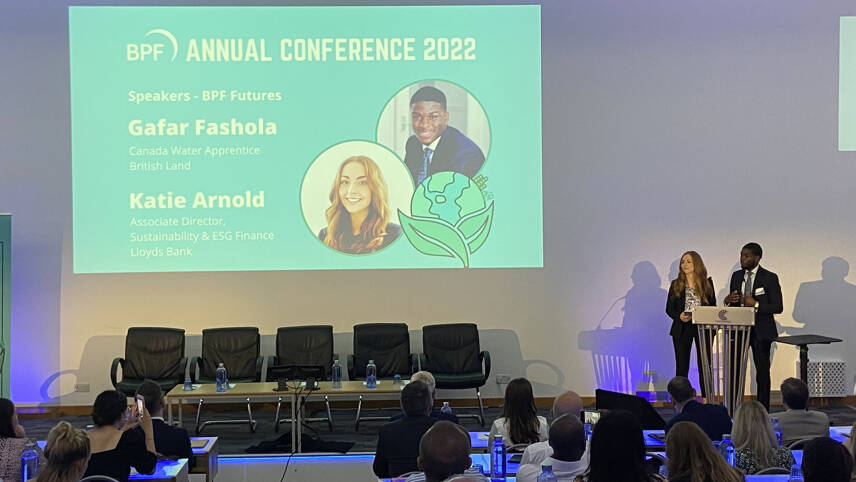Register for free and continue reading
Join our growing army of changemakers and get unlimited access to our premium content

Pictured: Katie Arnold of Lloyds Bank and Gafar Fashola of British Land launching the pledge at the BFP's London conference. Image: BPF
The Federation formally launched the pledge at its annual conference in London today (15 June) and will be urging all of its members to sign up as soon as they are able. Its membership includes all major parts of the UK’s real estate sector, including property owners and developers, estate agents, funding providers and consultancies.
In signing the pledge, a company will need to commit to reaching net-zero by 2050 and to support its long-term targets with “verifiable plans”. The BPF is requiring signatories to join the UN’s Race to Zero initiative by June 2023; the UN-backed campaign has criteria in place to ensure that supporters are taking ambitious and science-based approaches. Indeed, the Race to Zero criteria were themselves updated this week, with new measures to crack down on fossil fuel support and lobbying against climate policies.
Companies signing the BFP’s net-zero pledge will also commit to collaborating across the sector. They commit to “share research, knowledge and insight on an open-source basis” and to “support each other to accelerate the transition to net-zero”.
On the former, the Foundation will launch an internal net-zero network. This will include an online “knowledge hub” platform providing resources and discussion forums.
On the latter, the BPF is highlighting the importance of larger firms supporting SMEs to develop and deliver climate plans. Large firms with advanced carbon reduction plans already in place will need to mentor SMEs that are in the preliminary stages of their net-zero journey.
The BPF’s chief executive Melanie Leech said: “The built environment has a critical role in the UK reaching its net-zero target by 2050; currently responsible for up to 40% of emissions globally the industry needs to be at the forefront of innovation.
“Our membership is broad and diverse, with members at different stages of their journey to net-zero. The Net Zero Pledge aims to bring members together to support each other and share resources in order effectively to tackle carbon emissions before or by 2050 at the very latest.”
The BPF’s pledge was first confirmed back in March, prior to today’s official launch.
Also this spring, a cross-industry group was launched for the development of the UK Net Zero Carbon Buildings Standard, which will cover the embodied and operational emissions of new and existing buildings. Working group members are BBP, BRE, the Carbon Trust, CIBSE, IStructE, LETI, RIBA, RICS and the UK Green Building Council (UKGBC).
Climate-resilient buildings?
It is clear that decarbonising the UK’s building stock will be a challenge. Buildings account for around one-third of the UK’s energy consumption and emissions. With most buildings standing now still set to be standing in 2050 – the net-zero deadline year – the pressure is on policymakers and businesses to scale up retrofitting and improve energy efficiency.
Another challenge, emphasised in a new piece of research out today, will be improving the resilience of British buildings to climate impacts which are already “baked in”.
The research, published in the Oceans and Coastal Management journal, concludes that nearly 200,000 properties in England alone are likely to be abandoned by the 2050s due to sea-level rise. Areas set to be the worst affected are “diverse”, the study states, including North Somerset, Sedgemoor, Eastbourne, Wyre, North East Lincolnshire, Warrington, Swale, Dover and Portsmouth.
This forecast is predicated on predictions that mean sea levels around England will be around 35cm higher by 2050 than their historical level, with further rises likely in the 2060s and 2070s.
“Investment in improved sea walls and other defences will protect many of the properties at risk, but this will not be affordable or possible everywhere,” the paper warns. It calls for investment in adaptation infrastructure, and concerted collaboration between governments, local authorities, communities and the property sector to plan responses ahead of time. This collaboration could be embedded in the ongoing round of updates to local authority plans, with postponing “hard choices” likely to increase costs and social impacts, according to the paper.


Please login or Register to leave a comment.